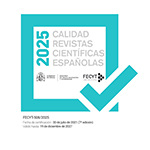The importance of film form in the cinema of Ruy Duarte de Carvalho
Abstract
The cinema of the writer and anthropologist Ruy Duarte de Carvalho has been studied from the perspective of anthropology and from the historical contextualisation of its political function in Angola in the 1970s and 1980s. In this paper I would like, in a complementary way, to examine his film form. Duarte's films are works of urgency, but they are also works of a poet for whom form is important: beyond facilitating their circulation, it helps the films to fulfil a function that goes beyond a mere propagandistic commission. Duarte de Carvalho's films are based on the postulates of the MPLA, but they problematise them, paying attention to and giving voice to ethnic groups whose relationship with reality does not fit in with linear time and the idea of progress. At the same time, their constructive strategies allow them to take flight and come ever closer to what Duarte once called unwritten poetry.
Downloads
Article download
License
In order to support the global exchange of knowledge, the journal Arte, Individuo y Sociedad is allowing unrestricted access to its content as from its publication in this electronic edition, and as such it is an open-access journal. The originals published in this journal are the property of the Complutense University of Madrid and any reproduction thereof in full or in part must cite the source. All content is distributed under a Creative Commons Attribution 4.0 use and distribution licence (CC BY 4.0). This circumstance must be expressly stated in these terms where necessary. You can view the summary and the complete legal text of the licence.










